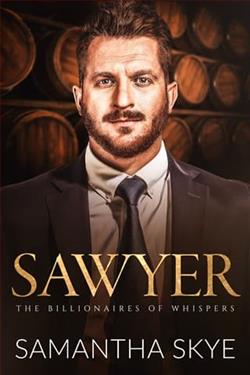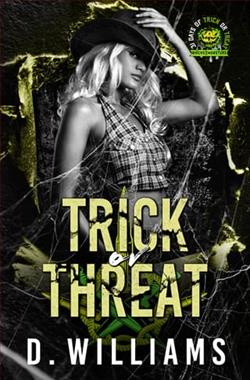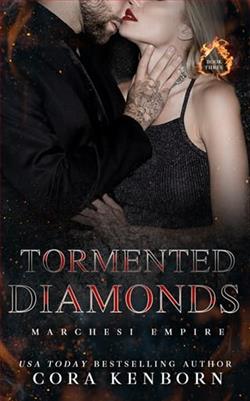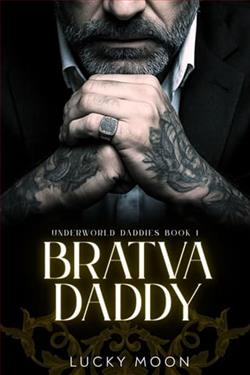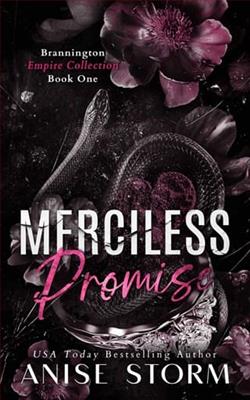Page 145 of A Smile Full of Lies
Chapter
Thirty-Four
DECEMBER 7
ROS
The irony wasn’t loston me.
Day twenty-one. The last day of the retreat. The day I was supposed to pack up and go home. The day I’d been looking forward to, even if it would also mean facing whatever Knox wanted to do, to punish me.
And what did the universe drop in my lap?
Thayer’s memorial service.
I worked until most of the night was gone, getting it all set of for the book’s release, learning so much stuff on the fly that my brain felt fried, if it hadn’t been already, then tossed and turned for the few hours I had left, barely getting any sleep. I stared at the ceiling for a long time, dreading that memorial service with every fiber of my being. I stared long enough for the pale morning light to bleed through the curtains, washing the room in a colorless haze.
It felt deliberate. It felt cruel.
Like the universe couldn’t resist one final twist of the knife before sending me back to the man I had almost died trying to protect.
My suitcase sat half-zipped by the door. My laptop was still open on the table, the final chapter ofWhat We Buried in Stonewoodstaring back at me. I hadn’t closed the file after checking that I had it all correct. I’d uploaded it to the publishing site, but I just couldn’t face the moment when I closed it, when I took that last step that said ‘this is done’. Just couldn’t bring myself to do it.
Not yet.
I stood slowly, wincing as my muscles protested. My shoulders and arms ached from sitting at the laptop, typing. My body remembered the knife, even if the scar was sealed now. A ghost of pain curled beneath my ribs low on my right side. The puncture wound high on the left side had a deeper ache, too close to my heart, but not close enough to stop it from beating.
I went to the window and stared out at the Tensaw river. It was as smooth as glass. A mirror. Cold and flat and reflective.
I hated that Thayer got a memorial… a celebration of life for a goddamn killer.
I hated that people would stand there crying over a boy they didn’t really know. That they’d dress in black and say nice things and pretend like he was anything other than a monster who’d chosen envy and violence over decency and happiness.
But his family would grieve him. They’d lay his ashes to rest and believe whatever lies helped them sleep at night.
And me?
I’d be watching from a distance. Because I had to see it to believe it, even though I was there when Alyssa shot him.
I had to watch them put the urn in the mausoleum. I had to know — for sure — that he was gone.
So I forced myself to eat something, drank the last cup of coffee and put the dishes away, then put the laptop to sleep, that file still open – because for me, until I saw Thayer’s urn put away, the story wasn’t really over – no matter what I’d said in the book.
Then I took my bags and put them in that shiny new car, and drove away without looking back.
I parked at the far edge of the cemetery, where the Spanish moss hung heavy from the live oak trees and the river breeze whispered through the pines like it knew something I didn’t.
Thayer’s family’s mausoleum sat at the opposite end of the cemetery, limestone and polished brass catching the late morning sun like it deserved to be something holy. It wasn’t. There was nothing sacred about what was being laid to rest inside it.
I didn’t get out of the car right away. Just sat there with my hands clenched tight around the steering wheel, watching people filter in through the massive wrought iron gates. Black dresses. Crisp suits. Sobs muffled by expensive linen handkerchiefs.
They didn’t know. They didn’twantto know.
I’d been there when he died. I’dfeltthe knife he meant for my heart. I’d watched Alyssa shoot him before he could finish the job. Watched him fall. Watched him die.
And still, there was a part of me that couldn’t quite believe he was gone until I saw his family bury him with my own eyes.
So I waited. Watched from a distance as the procession moved toward the mausoleum, a slow line of grief and denial. His mother was easy to spot. Her wails of grief carried across the cemetery like a banshee’s call come too late. She clutched the urn to her chest like she was cradling an infant. Like she was burying avictim, rather than a monster.








